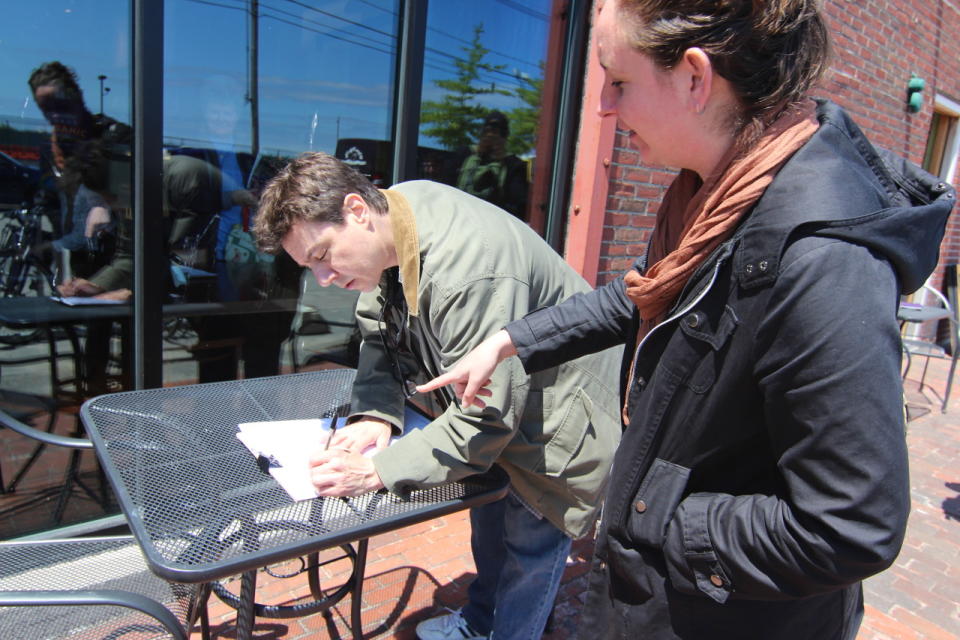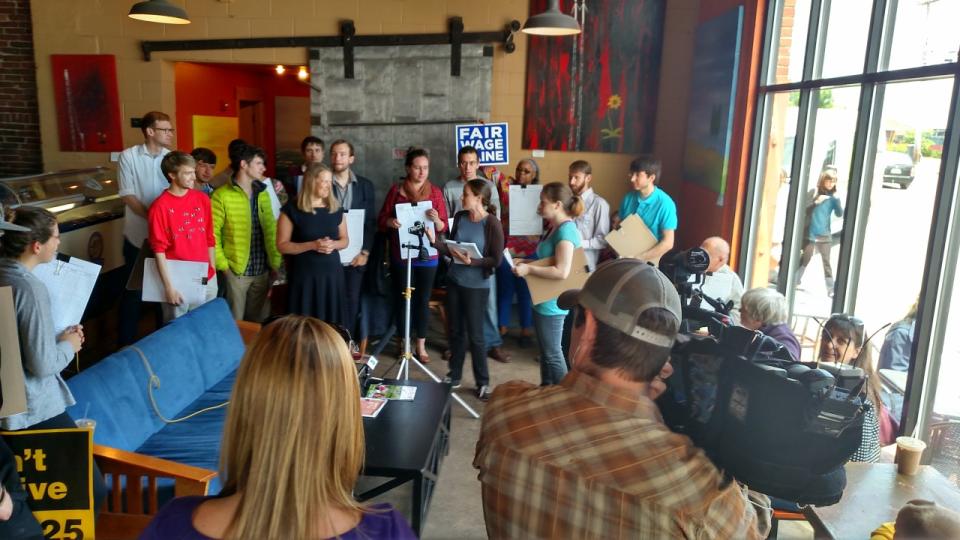The Fairness Project vies to raise the minimum wage at the ballot box

Mainers for Fair Wages is fighting to raise the state’s minimum wage. (Photo: Mainers for Fair Wages)
Could economic injustice be alleviated at the ballot box?
A new national organization dedicated to increasing the minimum wage in as many states as possible in 2016 officially launched Thursday.
The Fairness Project is already supporting local voting initiatives in Maine, California and Washington, D.C., and attempting to drive the national conversation around the current federal minimum wage of $7.25.
“We started the Fairness Project because our economic system is not working for millions of people in this country. Income inequality has reached its highest levels since the Great Depression, wages have stagnated, equality of opportunity – the pillar of American greatness – is disappearing before our eyes,” Ryan Johnson, executive director of the group, said on a press conference call Thursday.
This group describes itself as a reaction to congressional and state-level failures to enact basic economic measures that a majority of the country supports. Its launch marks the addition of a powerful ally for living-wage activists.
For the past year, to better understand the challenges, Johnson said, he has been traveling across the country to meet with community organizers, business owners and minimum-wage workers.
During each election cycle, the Fairness Project intends to focus on a different issue affecting the working class, whether it be providing earned sick days or easing the burden of student debt.
“Why [start with] minimum wage? Because quite frankly $15,000 a year is not enough to live on. No one who works full-time should be living in poverty,” Johnson said. “No state should accept this, no business model should support this and no family should have to endure this.”
Linea Hawkins, a Maine resident who broke out of the low-wage job cycle after many years, joined Johnson on the press call to endorse the organization’s activities. She shared her experience of a life in poverty, a cyclical problem that started in childhood.
“I’m tired of seeing my entire community struggle to pay for just the basics. I think what people forget is that a lot of people are struggling to get by on minimum-wage jobs, and we’re not alone. For every person that breaks out, there are five more that are stuck in minimum-wage jobs where I live.”

Activists collect signatures in an attempt to raise the minimum wage in Maine. (Photo: Mainers for Fair Wages)
Such activists have plenty of supporters. A poll conducted by Hart Research Associates shows that 75 percent of Americans, including 53 percent of Republicans, support increasing the federal minimum wage to $12.50 by 2020.
The two top-polling Democratic presidential candidates have both spoken in favor of raising the national minimum wage.
Vermont Sen. Bernie Sanders introduced legislation on July 22 to raise the federal minimum wage to $15 per hour, and the right to “a living wage” is a central pillar of his campaign platform.
“It is a national disgrace that millions of full-time workers are living in poverty and millions more are forced to work two or three jobs just to pay their bills,” Sanders said during a rally that day. “In the year 2015, a job must lift workers out of poverty, not keep them in it. The current federal minimum wage of $7.25 an hour is a starvation wage and must be raised to a living wage.”
Former Secretary of State Hillary Clinton, his main competition for the Democratic nod, supports raising the federal minimum wage to $12 per hour and encourages workers to organize for even higher wages at the state and local levels.
Even retired neurosurgeon Ben Carson, who knocked real estate mogul Donald Trump from the top spot in a recent Iowa poll of GOP presidential candidates, has spoken in favor of possibly raising the minimum wage, albeit not with the force of his Democratic counterparts.
“I think probably it should be higher than it is now,” Carson said on CNBC last May.
Not everyone supports a mandatory wage hike. Many fiscal conservatives say that raising the minimum wage inadvertently hurts the people it is supposed to help, namely low-skilled workers.

The Fairness Project is teaming up with local groups such as Mainers for Fair Wages to fight for raising the minimum wage. (Photo: Mainers for Fair Wages)
According to one common argument, employers hire workers based upon the profit they generate for their businesses; but the employer will fire workers for whom the minimum wage surpasses their productivity – turning them into a hindrance rather than an asset.
Trump has said several times that he is not a fan of raising the minimum wage because it would, from his perspective, make the U.S. less competitive in the global economy.
“One of the reasons companies are leaving is because salaries are too high. You look at what’s going on in Vietnam and China and so many different places, so we have to be very, very careful with that,” Trump said on Fox Business on Tuesday. “That sounds so easy but we have to be very, very competitive or we’re going to lose all of our jobs in this country.”
The businessman turned reality TV star turned presidential candidate also insists that a Trump administration would create enough well-paying jobs that people would no longer be worried about the minimum wage.
In conversation with Yahoo News, Johnson said he is not convinced by conservative arguments that raising the minimum wage would hurt small business or unskilled labor.
“In each of these states we are working hard to build a small-business coalition, making sure that their voice is part of the process,” he said in a phone interview. “In general, we believe that raising the minimum wage creates a positive feedback cycle. More money in the pockets of workers mean that people are willing to buy. … We think it’s likely to create jobs.”
The Fairness Project is legally structured as a 501(c)(4) social welfare organization. Organizers want it to survive into future campaign cycles, building upon best practices from previous years.
Right now, 29 states and Washington, D.C., have minimum wages that surpass the national requirement, whereas five states – Alabama, Louisiana, Mississippi, South Carolina and Tennessee – have not adopted state-level minimum wages.


